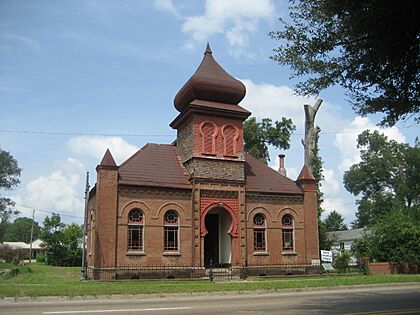Temple Gemiluth Chessed facts for kids
Quick facts for kids Temple Gemiluth Chessed |
|
|---|---|

The former synagogue, in 2008
|
|
| Religion | |
| Affiliation | Reform Judaism (former) |
| Ecclesiastical or organisational status | Synagogue (1892–1986) |
| Status | Closed; abandoned |
| Location | |
| Location | 706 Church Street, Port Gibson, Mississippi |
| Country | United States |
| Architecture | |
| Architect(s) | Bartlett and Budemeyer |
| Architectural type | Synagogue architecture |
| Architectural style | Moorish Revival |
| General contractor | J. F. Barnes |
| Date established | 1870 (as a congregation) |
| Groundbreaking | 1891 |
| Completed | 1892 |
| Construction cost | $7,000 |
| Materials | Red brick |
Temple Gemiluth Chessed is an old Jewish building in Port Gibson, Mississippi. Its name means "Acts of Loving Kindness" in Hebrew. This building used to be a synagogue, which is a place of worship for people who follow Judaism. It was built in 1892 and is special because it's the oldest Jewish congregation in Mississippi. It's also the only building in the state built in the unique Moorish Revival style.
The Jewish community in Port Gibson started this congregation in 1870. Many of them were immigrants from German areas. Over time, as people moved to bigger cities, the community became smaller. The synagogue closed its doors in 1986.
Contents
A Look Back at History
The Jewish community in Port Gibson began in the 1840s. These early settlers were Ashkenazi Jews who came from parts of Germany. Many started out as peddlers, selling goods from place to place.
In 1870, they created the Port Gibson Jewish cemetery. Then, in 1892, they built the synagogue on Church Street. Records show that a group called the Hebrew Benevolent Society of Port Gibson bought the land for $300 in 1887.
The Synagogue's Importance
Temple Gemiluth Chessed is the oldest synagogue building still standing in Mississippi. It's also the only one built in the special Moorish Revival style. At its busiest, around the early 1900s, about 50 to 60 Jewish families lived in Port Gibson. Most of the men worked as merchants or traded cotton.
Why the Community Changed
As towns along the Mississippi River became less busy in the late 1900s, the Jewish community in Port Gibson also got smaller. Younger generations moved to larger cities for more opportunities. Because of this, the congregation closed in 1986.
The community gave their Torah (a holy scroll) and other important items to the Museum of the Southern Jewish Experience. This museum is now located in New Orleans, Louisiana.
The synagogue building itself was almost torn down for new construction. However, people who were not Jewish bought it and saved it. They wanted to make sure this important piece of history was preserved.
What the Building Looks Like
The outside of Temple Gemiluth Chessed is very interesting. It has a special keyhole-shaped doorway, which is a Moorish style. Above this doorway, there's a Russian-style dome called a cupola. The windows in the tower that holds the dome are also shaped like Moorish keyholes. The windows on the main brick part of the building look like simple arches from the outside.
Inside the Synagogue
When you look at the inside, it's clear the people who built it wanted a fashionable Moorish Revival style. The colored glass in the windows is shaped like Moorish keyholes. These are set into arched openings in the brick walls. This was a clever way to get the Moorish look without expensive fancy brickwork. The beautiful arch for the aron kodesh (the cabinet where the Torah scrolls are kept) is especially elegant.
See also
- History of the Jews in the United States
- List of the oldest synagogues in the United States
 | James Van Der Zee |
 | Alma Thomas |
 | Ellis Wilson |
 | Margaret Taylor-Burroughs |


